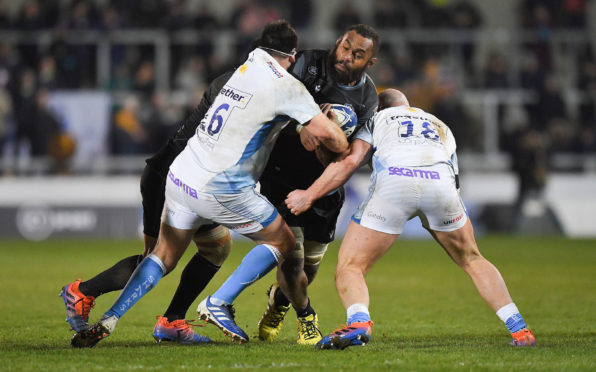In the end, it really had to be Saracens – for whom this year’s Heineken Champions Cup might represent their last competitive rugby at the elite level, ever – who did for Glasgow Warriors’ European campaign.
The defending champions, summarily relegated by the Gallagher Premiership on Saturday for repeated breaches of the league’s salary cap, beat Racing 92 at Allianz Park to deny Glasgow a place in this year’s quarter-finals.
The Warriors had done their bit with a 45-7 demolition of a young Sale Sharks team in Salford on Saturday evening, possibly their best performance of the season despite the callow nature of the opposition.
But the damage had been done, by the defeat at Scotstoun to La Rochelle in December, and by the failure to convert just one more of the favourable chances they had to beat Exeter a week previously.
They needed Saracens, in the midst of a possibly existential crisis, to lose to Racing and Gloucester then to lose to Toulouse in France after Northampton had beaten Lyon on Saturday.
But it was surely always going to be the disgraced English and European champions, who demolished Glasgow both times they previously reached the last eight with a team compiled in full and flagrant breach of their league’s regulations, who once again proved pivotal.
Warriors heads coach Dave Rennie, taking advantage of a couple of weeks’ break to head off and do some groundwork for his next job in Australia, was in Dubai on a stopover when he got the news. But he’d been fearing the worst since the La Rochelle game.
“We probably did enough to get five points last week but didn’t, and the loss at home to La Rochelle was a killer because we definitely had more than enough opportunity there,” said Rennie after the Sale win.
“It is what it is. We’ve been playing a lot better footie recently, the last month has been far more clinical, but we’ve had no control of what happens from here.”
The consolation is that during this spell when some had Glasgow tapped as a crisis club – all things are relative, one supposes – they seem to have found their momentum.
It’s too late to save them in Europe, but there was a freedom and intent behind Saturday’s performance that augured well for the next couple of months, when the club have to ride the international absences for the Six Nations and re-establish their play-off rights in the PRO14.
Leone Nakarawa’s return may prove the spark that has galvanised the team. He scored a try with his first touch after less than three minutes to set them on their way against Sale, and brought his usual selection of athleticism and ball skills, but what really impressed were his basics, rock solid for a man who hadn’t played a minute since Fiji went out of the Rugby World Cup.
And his skills even rubbed off on Jonny Gray, who himself off-loaded six times – two more than Nakarawa – and was a dynamic force about the pitch not just in defence. There was even a cheeky pick from a ruck that started a brilliant move ending in a “try” for Huw Jones, with the TMO playing killjoy spotting he was at least two yards offside.
The only issue was that there were far too many penalties, but this was always a staple when Glasgow were winning in the PRO14, and perhaps playing on the edge is what makes them so entertaining and effective at their best.
Nothing on the pitch at the AJ Bell Stadium made one feel despair about the forthcoming Six Nations, and the same was true at Murrayfield, where Edinburgh cantered into the Challenge Cup quarter-finals with a bonus point win over Agen.
Darcy Graham scored four tries, all four of them better and requiring more skill input than the already celebrated brace he scored against Glasgow three weeks ago. Those were just Darcy running very fast, these involved fine support play, elusiveness and footwork, and the trademark pace and opportunism.
Less obvious was the contribution of Hamish Watson – a quota of carries, turnovers, and off after an hour without any damage. He may now be the most important player Gregor Townsend has at his disposal for the forthcoming championship.
For Edinburgh, there’s a quarter-final to play in April, back at Bordeaux-Begles’ Parc Lescure, where they lost comfortably last week.
But that was not a full-strength Edinburgh, and barring injuries in the Six Nations they’ll be going back fully-loaded. And they don’t need to fear any team in Europe at their best.
